Past, present and future plans of Utkal University; Engineering college from next year
Following is from Samaja.
Following is from Sambada.
November 28th, 2011
Following is from Samaja.
Following is from Sambada.
November 28th, 2011
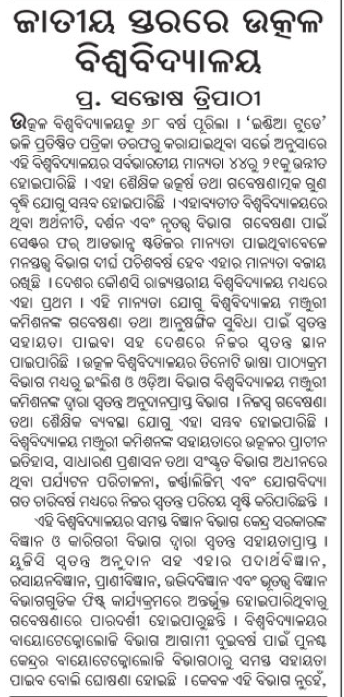
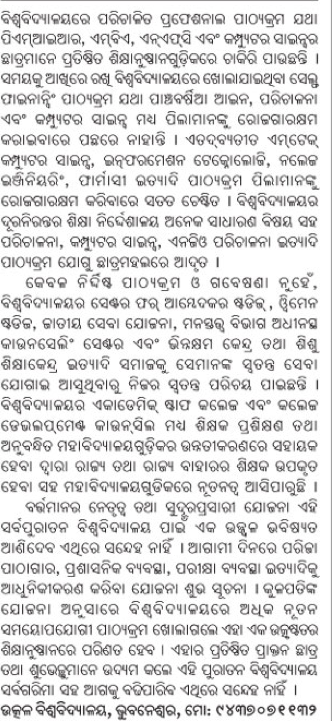
Following are some of the highlights mentioned in the above article.
November 27th, 2011
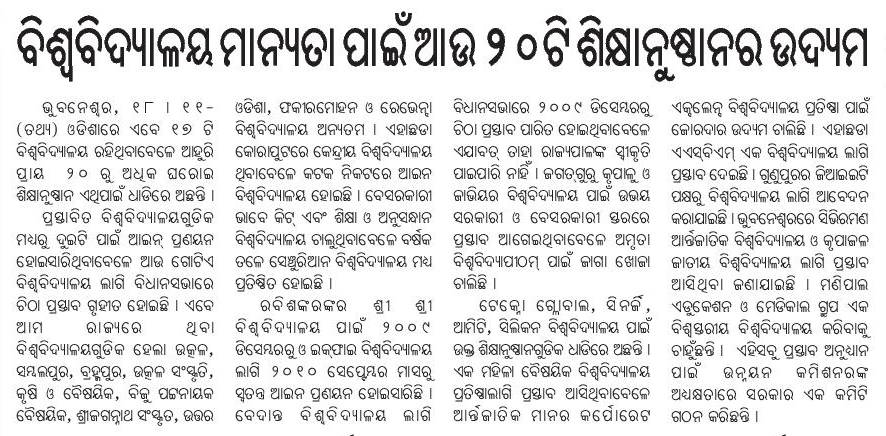
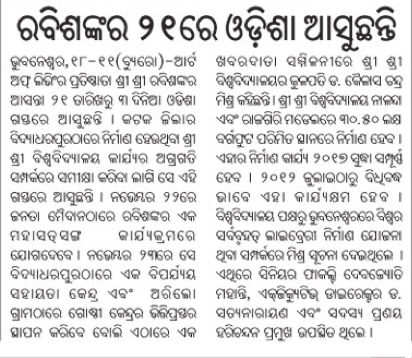
The 30.5 lakh sq feet is equivalent to 2,83,355.4066 sq meters and is equivalent to 70.0158 acres. As a comparison:
November 20th, 2011
Following is an excerpt from a report in Telegraph by Priya Abraham.
Utkal University is set to establish an engineering college in the capital.
… “The proposal to set up a new technical college has already been discussed by the syndicate and will be taken up by the academic council. The target is to start the new institute by the next academic session. A committee of experts will be set up to finalise the project,” Utkal University vice-chancellor P.K. Sahoo told The Telegraph.
“The team would discuss technical and academic aspects of the institute. Based on its recommendations, the institute will be set up,” said Sahoo.
The college will be located on the varsity campus and will have modern facilities and equipment. “We are trying to bring in diversification. For the staff salary, pension and modernising the varsity, there is a need for adequate funds. The UGC and state government have already asked state universities to try and raise their own funds. Only then can the varsity be self sustainable,” said the vice-chancellor.
Officials said a special budget would be sanctioned to make various provisions for the proposed institute.
However, this initiative by the university has surprised many people because technical education in the state is passing through a grim phase. About 22,000 of the 38,000-odd engineering seats are lying vacant. This number is around 5,000 more than last year.
… “There is definitely a lot of scope. Utkal University is a premier university and has earned a good name at the national level. Like all other self-financing courses that we have launched, this would also be a successful one,” said PG council chairman Pradip Kumar Sarkar.
Although there is a glut of engineering seats in Odisha with more than half the available seats unfulfilled, this is still a good move. This is along the lines of the recommendation by the Yashpal committee which recommended more well rounded universities. Having an engineering college as part of the university will make Utkal a more well-rounded university. In particular, being part of a university, the engineering program can take advantage of the existing university faculty in many disciplines (especially, English, Business, Economics, Psychology, Sciences, and Mathematics) and foster many cross disciplinary programs and research projects.
This action also shows that the new Utkal VC is a man of action and is willing to take risks. This bodes well for Utkal.
ps — We thank Prof. Arun Pujari, the immediate past VC of Sambalpur University, for having led the way in this direction by establishing SUIIT with several engineering programs and several other innovative programs. It is unfortunate that several locals and some activists could not understand his groundbreaking contributions and lobbied to deny him a second term. We hope that the new Sambalpur VC will continue the progress than Prof. Pujari made in Sambalpur.
November 19th, 2011
The website of this summit is http://www.ficci.com/past-Events-page.asp?evid=20665. Following are excerpts from the press release on Dr. Montek Ahluwalia’s speech.
Inaugurating FICCI Higher Education Summit 2011: Strategies for Expansion in Higher Education in India’, Mr. Ahluwalia said, “The challenge before planners, policy makers and educationists, both in the public and private sector, was of producing world class Indian universities that could be counted in the top 200 rating list.” In the next 20 years we must see a significant number of educational institutions in that category, he declared.
Mr. Ahulwalia also underlined the need to lend an international flavour to Indian universities by inducting international faculty. This would not happen unless the government removes the restriction on employment of international faculty, he said.
For higher education, the 12th Plan objective was expansion, equality of access and excellence. The aim was to raise the gross enrolment ration from the current level of 15 per cent to 30 per cent over the next 15 years. “Expansion of higher education has to be balanced with equality of access, especially for those living in areas where educational institutes did not exist,” he said.
Following are excerpts from the press release on Sam Pitroda’s speech.
Addressing the FICCI Higher Education Summit 2011, Mr. Pitroda said, “Higher education reforms are essential if the nation is to meet the serious challenge of skill shortage that will not allow the economy to grow at 8-10 per cent annually. While many of the recommendations of the National Knowledge Commission are in the process of being implemented, we are waiting for the government to act on the recommendations retailing to reform of higher education.”
“The debate on what needs to be done ought to be over, the time now is to focus on action,” he said and added that “the Bills have already been drafted but none of them have been tabled in or passed by Parliament.”
Mr. Pitroda’s concern found an echo in FICCI President, Mr. Harsh Mariwala’s suggestion that although education continues to be a priority sector during the Twelfth Plan, unless the reform agenda initiated by the Ministry of Human Resource Development in the 11th Plan is carried forward within a stringent timeframe, the demographic dividend of a young population could become a demographic disaster for India as well as the world.
Mr. Mariwala hoped that the Foreign Education Providers’ Bill; Unfair Practices Bill; Tribunal Bill and the Accreditation Bill will be passed in the coming winter session of the Parliament and the National Commission for Higher Education and Research (NCHER) Bill 2010 and Innovation University Bill will be introduced in the winter session of the Parliament. The delay in implementation of the reforms is a serious impediment for the economic development of the country, he said and added that FICCI earnestly urges the political leadership to take cognizance of this fact.
Mr. Pitroda said that the government was creating a US$ 5 billion National Knowledge Network (NKN) which is expected to be ready in about nine months. The network would be a state-of-the-art multi- gigabit pan-India network for providing a unified high speed network backbone for all knowledge related institutions in the country. It would facilitate the building of quality institutions with requisite research facilities and creating a pool of highly trained professionals. The NKN will enable scientists, researchers and students from different backgrounds and diverse geographies to work closely for advancing human development in critical and emerging areas.
Following are excerpts from a report in Chronicle of Higher Education.
Mr. Sibal has said that private participation in higher education must be encouraged, and conference attendees agreed that if the government hopes to reach its goal of sending 30 percent of young people to college, both private and public participation are needed. The challenge, as always, is in weeding out the low-quality operators.
"The public perception of private higher education is in a range," said Montek Singh Ahluwalia, head of India’s Planning Commission, a top government policy-making body. "Many are good, but there is a problem of those not-very-good ones."
Mr. Ahluwalia argued that supply and demand will eventually eliminate the bad actors, but others disagreed.
"It will be difficult to weed them out," said M. Anandakrishnan, head of the Indian Institute of Technology’s Kanpur branch. Because there is more demand than supply, he said, it will take time for stakeholders to make discerning choices.
Another delegate, Sachi Hatakenaka, a British-based education researcher, argued that "private sector growth is good for quantity but not for quality."
… Still, said Mr. Agarwal, the next round of government higher-education planning will focus more on expanding capacity at existing institutions rather than adding new universities.
Some private players were hopeful that the government will look to the private sector more as an ally than an adversary in coming years.
November 16th, 2011
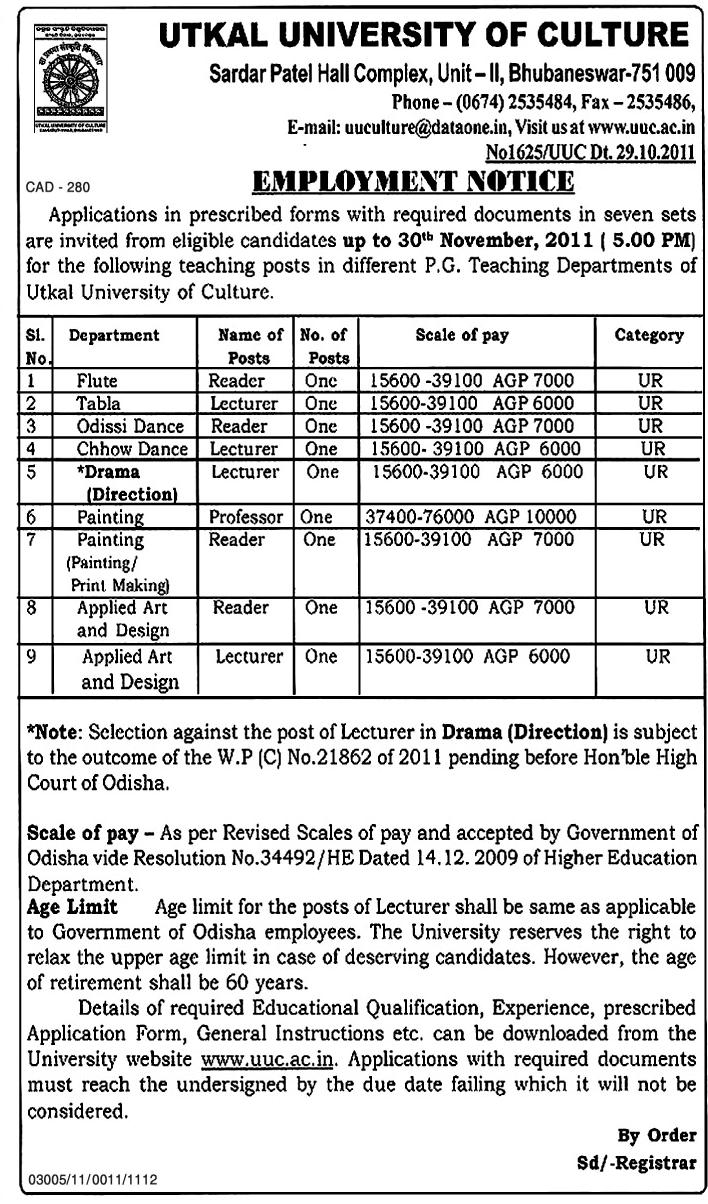
November 1st, 2011
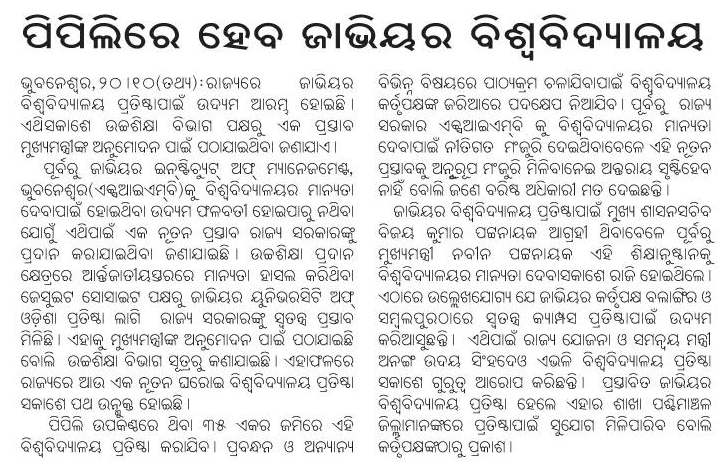
2 comments October 21st, 2011
The following quotes are from an article in pagalguy.com.
… a push from the state government, cheap land prices, a pool of students from the neighbouring states of Jharkhand, Bihar, West Bengal and the North East as well as investments by large corporate houses are slowly changing the eastern state’s identity. After Hyderabad, it is Odisha which is steadily becoming the focal point for educational institutes to set up their campuses.
… Ratnakar Rout, Joint Secretary, Department of Technical Education, Odisha. “We want to make Bhubaneshwar an educational hub,” he said. “The government wants institutes of international repute to start up so that students from the entire eastern belt can come here for education.” Rout added that many industrial houses, investors and institutes (including foreign universities) are also interested to start operating from Odisha. …
… Dr Somayajulu Garimella, director of IMI Bhubaneshwar, says that it is primarily the Odisha government’s proactive stance towards investment in the state that is paving the way for this migration. “The government is acting like a catalyst and there is fantastic support from them in terms of clearances,” said Garimella.
… According to Dr Harivansh Chaturvedi, director BIMTECH, the saturation of b-schools in other states, low living costs and burgeoning middle class population of urban Odisha are some other reasons for b-schools to choose to come to the state.
The Odisha government has been cooperative in terms of allotting land at cheaper prices, say educational administrators. “The government is friendly and we were alloted 30 acres of land at the cost of Rs 8 lakhs per acre,” said Chaturvedi. This was in stark contrast to the price of land in neighbouring states such as Uttar Pradesh and Haryana, where, according to Chaturvedi, land prices can go upto Rs 2 crores for an acre. “We should not invest too much on physical infrastructure like land, as it is expensive,” added Chaturvedi.
… Harivansh Chaturvedi has answers for some of these doubts. “Our target is not just the local students, but the aim is to tap the pan-India market,” he said. “Also, in terms of competition we are looking at the future and within five years there is a possibility that the government might allow foreign universities to set foot in this part of the country.” BIMTECH and IMI are also not very worried about the initial years in terms of placements as their Delhi campuses will mentor the ones in Bhubaneshwar until they can stand on their own feet.
… Sri Sri University, which does not enjoy the reputation that IMI or BIMTECH have as far as business education is concerned, has other ways of getting their graduates jobs. “The ‘Art of Living’ community boasts of one of the largest corporate following,” informed Malaya Malla, marketing manager of the university. “The university has received strong commitments from corporates for offering summer projects and final placements.”
3 comments October 3rd, 2011
Following is from a report in indiaeducationdiary.com.
National Law University, Orissa (NLUO) has finally decided to join Common Law Admission Test (CLAT) of 2012.
The decision was taken at the meeting of the University Executive Council chaired by Prof. (Dr.) Faizan Mustafa, Vice-Chancellor, NLUO. …
NLUO, which came into being in 2009, was conducting its own admission test till date. For the last three consecutive years, the NLUO admission test was receiving highest compliments from renowned evaluators of law tests from all over the country. …
However, the Executive Council has taken a stand to become a part of the mainstream law entrance test because the students shall now give higher preference to NLUO due to good reputation carved by it in the last three years.
What sets NLUO apart from other law schools is its integration of knowledge by the adoption of an interdisciplinary approach: a student from a Social Science stream can opt for a Management course and vice- versa. The introduction of courses like Mining Law, Food Law, Water Law, Energy Law, Agricultural Law and Legal Journalism also adds to the uniqueness of the university. In addition, NLUO has also launched a unique conjoint Ph.D-LLM program that will include intensive teachers’ training program, Educational Psychology, learning tools and stipends. Unlike other Ph.D courses offered nationwide, this research program by NLUO provides LLM degree as a by product. …
September 29th, 2011
Further updated on April 4, 2012.
Further updated on February 4, 2012. These updates are in pink.
Further updated on December 7, 2011. These updates are in red.
The following was compiled from http://www.iiit-bh.ac.in/faculty/faculty-list and http://www.iiit-bh.ac.in/downloads/AdmissionBrochure2011.pdf?attredirects=0&d=1 on September 23rd, 2011. (For an older list compiled in March 2011 see https://www.orissalinks.com/archives/6149.)
Computer Science:
Electrical Engineering:
Electronics:
Mechanical Engineering:
Physics:
Chemistry:
Mathematics:
Humanities:
3 comments September 25th, 2011
This ranking seems to be mainly based on perception and seems to me that the comparative assessment for Utkal University is a fair one and matches with my perception of the success achieved by Utkal University graduates.
1 comment September 21st, 2011
Following is an excerpt from Shilpi Sampad’s report in Telegraph.
The prestigious Cuttack university has come up with a novel concept where postgraduate toppers are being given an opportunity to take classes at the undergraduate level in their respective fields for one year. Fourteen toppers have been appointed as “vice-chancellor’s scholars” to be part of their respective departments not only to teach but also to assist in research work, maintain archives and other work. They would be paid a consolidated monthly remuneration of Rs 8,000 from the university funds, said varsity officials.
“The toppers will be involved in departmental functioning and attached to the V-C’s office for executive assistance,” said Chandi Prasad Nanda, head of the history department at Ravenshaw University.
Stating that the programme was the brainchild of vice-chancellor Devdas Chhotray, Nanda said the objective was to guide meritorious students and encourage them to take up teaching as a profession.
“The idea behind this novel initiative is to motivate young scholars to engage themselves in teaching and research work. Here, they would work as interns and can, simultaneously, pursue M.Phil programmes. Through this exposure, they can be sensitised to research trends and pick up teaching skills. It would also prepare them for competitive exams,” said Dipti Ranjan Sahu, head of the sociology department.
The toppers, who have been taking classes since the beginning of this month, seemed happy and excited about being given this opportunity.
“This is an opportunity of a lifetime. I can now understand how difficult a teacher’s job is. We take one to two classes a day and look after other activities of the department. Although it is slightly hectic, I am enjoying every bit of being a teacher,” said Kaikashna Begum, a V-C scholar and gold medallist of the political science department.
This is a wonderful scheme and would encourage many of the toppers to pursue academics, which will help help alleviate the faculty shortage in India.
September 14th, 2011
Currently there is a College of Agriculture and a College of Horticulture in Chipilima.This will be the third OUAT College in Chipilima.
Following is an excerpt from a report inibnlive.com.
The State Government has decided to open another College of Horticulture at Khurda on OUAT’s existing School of Horticulture premises for development of manpower in the sector.
Agriculture Minister Pradeep Maharathy announced this while speaking at the 50th foundation day of the Orissa University of Agriculture and Technology here on Wednesday.
Currently OUAT has only one College of Horticulture in Chipilima. This will be its second college of Horticulture. See http://en.wikipedia.org/wiki/Orissa_University_of_Agriculture_and_Technology for the list of Colleges of OUAT.
1 comment August 25th, 2011
Following is from a report in ibnlive.com.
The Assembly on Monday passed a Bill amending the Orissa University of Agriculture and Technology Act, 1965. The amendment enables OUAT to accord affiliation to institutions in the private sector for imparting education in agriculture, veterinary, fisheries, forestry and allied sciences.
… While students are keen to take admission in the constituent colleges of OUAT, the existing intake capacity is limited. The university has received about 12,000 applications for admission into various courses while the total number of seats available in the colleges of agriculture, agricultural engineering, fisheries, veterinary science and home science is 608.
Many private organisations have evinced interest to set up institutions to provide quality education in agriculture and allied sciences. This will benefit the State which is based on agrarian economy, the minister added.
While leader of the Opposition sought to know from the Minister if any other Agriculture University of the country has such a provision to affiliate private institutions, the latter said that Rajasthan and Himachal Pradesh had taken the lead.
August 23rd, 2011
One of the main aspect of this bill is that it will allow private agricultural colleges to be affiliated to OUAT. I think this is a good move and if what is mentioned in the excerpt below from ibnlive.com is true, it is surprising that no other state agricultural university allows that.
… none of the 38 agriculture universities in the country has given permission to any private organisation to set up college in agriculture, veterinary and allied sciences, he wanted to know as to why the State Government is so keen on allow entry of private sector in the State. Discussion on the Bill remained inconclusive.
From my quick research I found the following:
So even if what is mentioned in the ibnlive.com article is true, why should Odisha take a lead for once and allow OUAT to have affiliated private colleges.
1 comment August 21st, 2011
| M | T | W | T | F | S | S |
|---|---|---|---|---|---|---|
| 1 | 2 | |||||
| 3 | 4 | 5 | 6 | 7 | 8 | 9 |
| 10 | 11 | 12 | 13 | 14 | 15 | 16 |
| 17 | 18 | 19 | 20 | 21 | 22 | 23 |
| 24 | 25 | 26 | 27 | 28 | 29 | 30 |
| 31 | ||||||